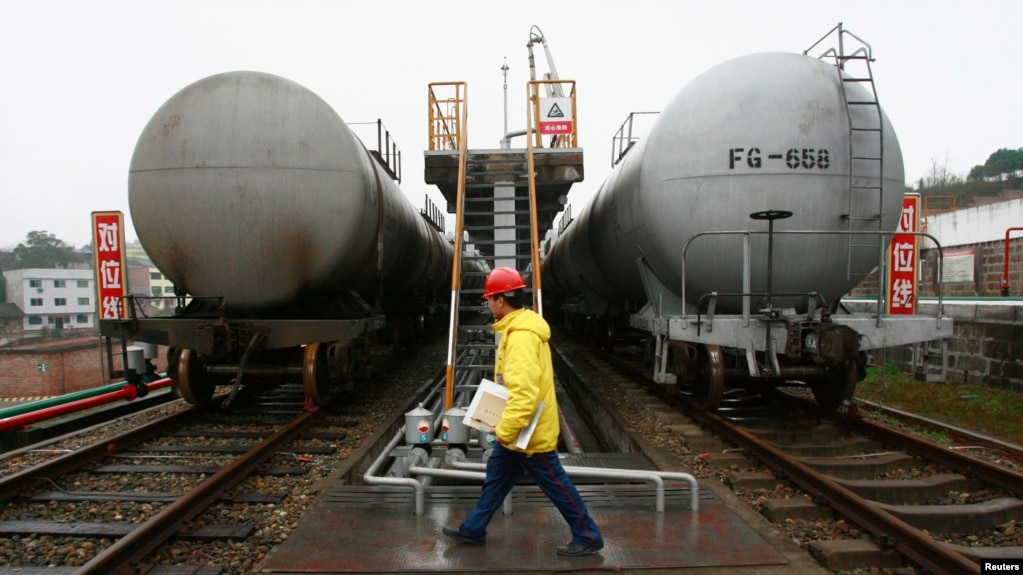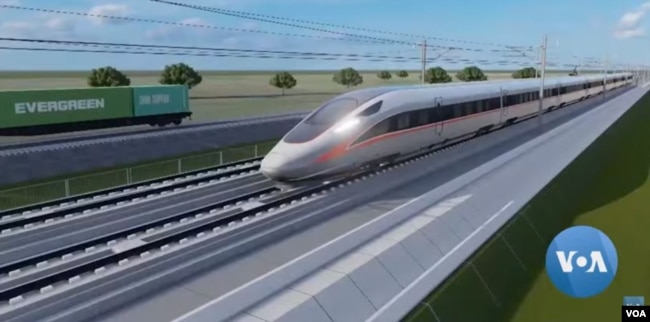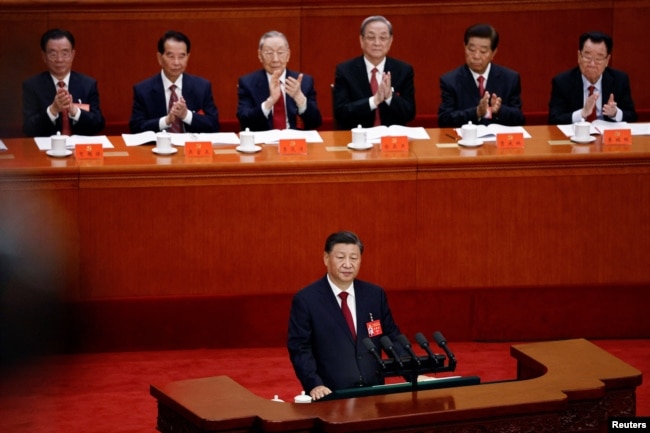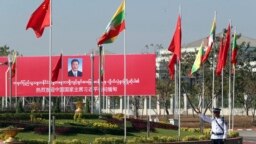March 13, 2023
VOA Burmese Service

A worker walks past trains transporting oil tanks in Suining, Sichuan province.
Talks reportedly have resumed after pandemic-related delays about a railway project in Myanmar to connect China's Yunnan province to the Bay of Bengal.
WASHINGTON —
After pandemic-related delays, discussion is now underway about resuming work on the railway project in Myanmar that will connect China's Yunnan province to the Bay of Bengal, according to the Myanmar government.
The project is part of China's Belt and Road Initiative that includes construction of the Pan-Asian Railway Network that would include Myanmar, Vietnam, Thailand and Cambodia.
WASHINGTON —
After pandemic-related delays, discussion is now underway about resuming work on the railway project in Myanmar that will connect China's Yunnan province to the Bay of Bengal, according to the Myanmar government.
The project is part of China's Belt and Road Initiative that includes construction of the Pan-Asian Railway Network that would include Myanmar, Vietnam, Thailand and Cambodia.

The railway project covers approximately 1,000 kilometers and is divided into two sections in Myanmar — from Muse to Mandalay and from Mandalay to Kyaukphyu, a port city on the Bay of Bengal. The railroad, when completed, will give China a shipping route that bypasses the Straits of Malacca between Malaysia and Indonesia.
"We have signed several agreements with China for development projects," Major General Zaw Min Tun, a spokesman for Myanmar's military government, told VOA Burmese late last week. "The railroad project to Kyaukphyu is included in those development agreements. … Field inspection and reports have been completed. The implementation to resume the projects are still being discussed."
VOA Burmese emailed the Chinese Embassy in Washington, D.C., for comment on the project but received no response.
Beijing, which is dependent on Middle Eastern oil, wants to avoid the possibility of a foreign power disrupting oil shipments from the Middle East by blockading the straits.
At the 20th Party Congress in October, President Xi Jinping stressed that energy security was one of Beijing's key concerns. China imports some 70% of the crude oil it needs, and much of that comes from Saudi Arabia, although Russia has become a larger supplier since invading Ukraine was followed by international sanctions that closed other markets to Moscow.

Chinese President Xi Jinping speaks at the opening ceremony of the 20th National Congress of the Communist Party of China, at the Great Hall of the People in Beijing, China, Oct. 16, 2022.
A senior official at the Myanmar Transportation Department who was not authorized to speak to the press and asked to remain unnamed confirmed the meeting last week in the capital city of Naypyitaw with Chinese counterparts to resume the railroad project developed by the state-run Myanma Railways and the China Railway Eryuan Engineering Group (CREEG).
"Previously it was OBOR, One Belt, One Road. After that, the Belt and Road Initiative (BRI)," the official told VOA Burmese. "We suspended the project due to COVID. … [The] Chinese are in consultation to resume the Kyaukphyu project eventually."
The preparation of the bilateral memorandum of understanding for the Kunming-Kyaukphyu railway, which is estimated to cost $9 billion, was executed in 2019. The railway projects were among the 33 agreements signed by Xi during his visit to Myanmar in January 2020.
A senior official at the Myanmar Transportation Department who was not authorized to speak to the press and asked to remain unnamed confirmed the meeting last week in the capital city of Naypyitaw with Chinese counterparts to resume the railroad project developed by the state-run Myanma Railways and the China Railway Eryuan Engineering Group (CREEG).
"Previously it was OBOR, One Belt, One Road. After that, the Belt and Road Initiative (BRI)," the official told VOA Burmese. "We suspended the project due to COVID. … [The] Chinese are in consultation to resume the Kyaukphyu project eventually."
The preparation of the bilateral memorandum of understanding for the Kunming-Kyaukphyu railway, which is estimated to cost $9 billion, was executed in 2019. The railway projects were among the 33 agreements signed by Xi during his visit to Myanmar in January 2020.

SEE ALSO:
China Draws Myanmar Closer with Visit from President Xi
China and Myanmar approved the route for the first segment in 2019. The project will traverse rugged terrain and areas of Myanmar where ethnic armed organizations have fought the Myanmar military and each other for decades.
After the military coup in February 2021, Burmese and Chinese scientists conducted an environmental assessment of the first section of project, which was approved in 2022. Preparations for the second segment began late last year, according to the website, Frontier Myanmar, and were confirmed by Zaw Min Tun.
In late February, China's special envoy for Myanmar affairs, Deng Xijun, held meetings in Myanmar's Shan State with representatives of ethnic armed organizations (EAOs), including the Kachin Independence Army (KIA), the United Wa State Army (UWSA), and the National Democratic Alliance Army (NDAA) to discuss trade and economic cooperation with a focus on the railway from Yunnan to Muse and Kyaukphyu.
Deng's visit was intended to build ties with the EAOs, as well as to persuade them to reach some form of cease-fire with the military government that came to power with a February 2021 coup. China has expressed concern about instability in Myanmar and the West's support for the anti-military opposition soon after the coup in an editorial published in the Global Times, a newspaper affiliated with the Chinese Communist Party.
A rail line connecting China with Thailand via Laos is scheduled to begin operations at the end of May, according to a March 3 release from the railroad. The China-Laos-Thailand round-trip train service will run every other day. Service is scheduled to be expanded to one train per day at the end of June.
No comments:
Post a Comment